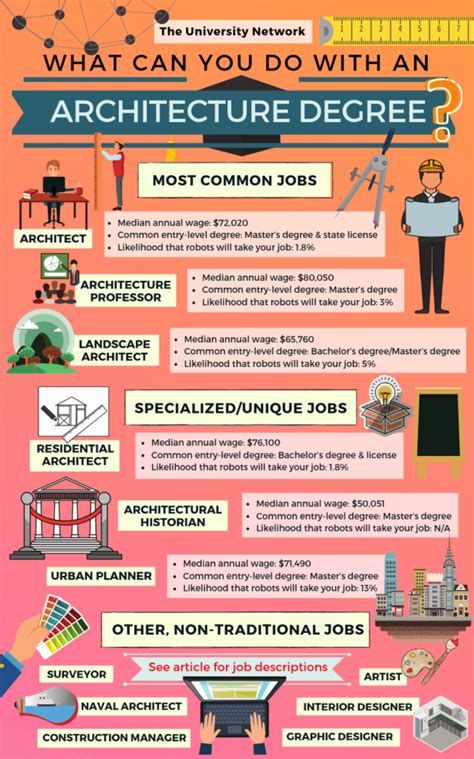Introduction

Earning an architecture degree opens doors to a world of rewarding career opportunities. As the built environment continues to evolve, architects are in high demand to design and create spaces that enhance our lives. This comprehensive guide will explore the various job options available to architecture graduates, providing insights into their responsibilities, earning potential, and career paths.
Job Responsibilities of Architects
Architects play a pivotal role in shaping the physical world around us. Their responsibilities encompass a wide range of tasks, including:
- Design and planning: Architects create designs for new buildings, renovations, and additions. They work with clients to understand their needs and develop plans that meet their functional and aesthetic requirements.
- Site selection: Architects evaluate potential building sites, considering factors such as topography, environmental conditions, and zoning regulations.
- Project management: Architects oversee construction projects from start to finish, ensuring that designs are implemented as intended and that budgets and timelines are met.
- Building code compliance: Architects must ensure that their designs comply with all applicable building codes and regulations.
- Sustainability: Architects are increasingly focused on designing buildings that are environmentally sustainable and energy-efficient.
Types of Architecture Degree Jobs
The field of architecture offers a diverse range of job opportunities, each with its own unique challenges and rewards. Here are some of the most common architecture degree jobs:
1. Architectural Designer
Architectural designers work under the supervision of licensed architects. They develop design concepts, create drawings, and assist in project management tasks.
Responsibilities:
– Assist architects with design and documentation
– Prepare architectural drawings and models
– Collaborate with engineering and construction professionals
2. Project Architect
Project architects manage specific construction projects from start to finish. They work closely with clients, contractors, and other team members.
Responsibilities:
– Lead design and project management teams
– Oversee all aspects of construction projects
– Ensure projects are completed on time and within budget
3. Specification Writer
Specification writers create detailed written documents that describe the materials and methods to be used in construction projects.
Responsibilities:
– Write and review specifications for building materials and systems
– Ensure that specifications comply with building codes and standards
– Collaborate with architects and contractors
4. Urban Planner
Urban planners design and manage the physical development of cities and towns. They work with stakeholders to create plans that address issues such as housing, transportation, and economic development.
Responsibilities:
– Create master plans for urban areas
– Develop policies and regulations to guide development
– Collaborate with architects, engineers, and other professionals
5. Building Inspector
Building inspectors ensure that buildings comply with building codes and regulations. They inspect buildings during construction and periodically throughout their lifespan.
Responsibilities:
– Inspect buildings for safety and code compliance
– Issue permits for construction and renovation projects
– Work with architects and contractors to address code violations
Salaries and Career Path
The salary of an architect is influenced by several factors, including experience, education, and location. According to the U.S. Bureau of Labor Statistics, the median annual salary for architects in May 2022 was $87,380. The top 10% earned more than $151,230, while the bottom 10% earned less than $54,700.
Architects typically begin their careers as architectural designers or project architects. With experience and professional development, they can advance to more senior positions, such as project manager, principal architect, or urban planning director.
Benefits of Pursuing an Architecture Degree
Earning an architecture degree offers numerous benefits, including:
- Job stability: Architects are in high demand, and the job outlook is expected to remain strong in the coming years.
- Earning potential: Architects can earn comfortable salaries, with the potential to earn even higher salaries in leadership positions.
- Creative expression: Architecture allows individuals to express their creativity and make a lasting impact on the built environment.
- Intellectual stimulation: Architecture is a challenging and intellectually stimulating field that requires problem-solving, critical thinking, and collaboration.
- Career advancement opportunities: Architects have the opportunity to advance to senior positions and take on leadership roles within architectural firms or other organizations.
FAQs
1. What are the educational requirements to become an architect?
Most states require architects to hold a professional degree in architecture from an accredited program. This typically takes five years of full-time study.
2. What are the licensing requirements for architects?
Architects must be licensed in the state where they practice. The licensing process typically involves passing a national exam and completing a period of practical experience.
3. What are the career prospects for architects?
The career outlook for architects is expected to grow by 3% over the next decade, which is as fast as the average for all occupations. The demand for architects will be driven by the need for new construction and renovations.
4. What are the soft skills required to be a successful architect?
In addition to technical skills, architects must also possess strong communication, interpersonal, and problem-solving skills. They must be able to work effectively in teams and manage multiple projects simultaneously.
5. What are the job opportunities for architects outside of traditional architectural firms?
Architects can also find employment in a variety of other settings, including government agencies, construction management firms, and real estate development companies.
6. What is the future of architecture?
The future of architecture is expected to be shaped by technology, sustainability, and globalization. Architects will need to adapt to new technologies and design buildings that are environmentally friendly and meet the needs of a changing global population.
Conclusion
An architecture degree opens the door to a rewarding and fulfilling career path. Architects play a vital role in shaping the built environment, creating spaces that enhance our lives. With its diverse job opportunities, high earning potential, and opportunities for creative expression, pursuing an architecture degree is an excellent investment in your future.
